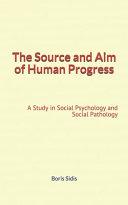Source: The Foundations of Normal and Abnormal Psychology (1914), p. 86
Works

The Source and Aim of Human Progress
Boris SidisFamous Boris Sidis Quotes
The Source and Aim of Human Progress (1919)
Source: Multiple Personality: an Experimental Investigation into Human Individuality (1904), p. 26
Source: The Foundations of Normal and Abnormal Psychology (1914), p. 117
“Self-preservation is the central aim of all life-activities.”
Source: Nervous Ills their Cause and Cure (1922), p. 20
Boris Sidis Quotes about life
“Not purpose but chance is at the heart of mental life.”
Source: The Foundations of Normal and Abnormal Psychology (1914), p. 100
Source: The Causation and Treatment of Psychopathic Diseases (1916), p. 37
Source: Nervous Ills their Cause and Cure (1922), p. 20
Source: Nervous Ills their Cause and Cure (1922), p. 285
Boris Sidis Quotes
Source: The Foundations of Normal and Abnormal Psychology (1914), p. 39
Source: Nervous Ills their Cause and Cure (1922), p. 275
The Psychology of Suggestion: a Research into the Subconscious Nature of Man and Society (1889), p. 90
Philistine and Genius (1919)
The Source and Aim of Human Progress (1919)
“Greatness of individuality is inversely proportional to the mass of the social aggregate.”
The Source and Aim of Human Progress (1919)
Source: Nervous Ills their Cause and Cure (1922), p. 311
Source: The Causation and Treatment of Psychopathic Diseases (1916), p. 33
“The course of evolution is to a greater integration of similarly functioning ganglia.”
Source: Multiple Personality: an Experimental Investigation into Human Individuality (1904), p. 16
The Source and Aim of Human Progress (1919)
Source: The Foundations of Normal and Abnormal Psychology (1914), p. 106
Source: The Foundations of Normal and Abnormal Psychology (1914), p. 112
“Science is the description of phenomena and the formulation of their relations.”
Source: The Foundations of Normal and Abnormal Psychology (1914), p. 11
The Source and Aim of Human Progress (1919)
Source: The Foundations of Normal and Abnormal Psychology (1914), p. 98
